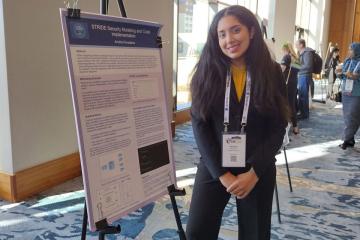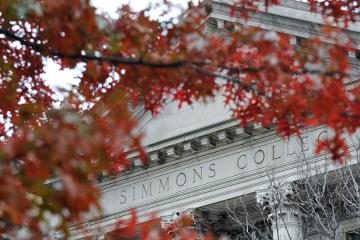Department of Computer, Data, and Mathematical Sciences
The Department of Computer, Data, and Mathematical Sciences has a long history of preparing both traditional and nontraditional women students for successful careers and for graduate school.
Empowering our students in the field
We provide an environment that empowers women in mathematics, computer science, and statistics and helps them to realize their potential in those fields. Sensitive to varied learning styles as well as to the changing workplace, we use a range of teaching methods to address students' individual needs. These include cooperative learning groups, use of computer laboratory investigations, and independent learning, as well as traditional teacher-directed learning. An important focus in our curriculum is modeling and real-world applications.
Students will learn to think critically, logically, and abstractly and gain a strong theoretical foundation on which to build their understanding of current technologies—and to imagine new innovations. Through hands-on class projects, students experiment with the design and development of websites, databases, applications, software, and other technologies. Building bridges between communication and programming, design and technical abilities, these students go on to careers in a wide range of industries.
Computer, Data, and Mathematical Sciences in the News
Computer, Data, and Mathematical Sciences Faculty and Staff
Our full-time faculty are leaders in their fields and mentors in the classroom.
Chair

Amber Stubbs
Associate Professor and Chair of Computer, Data & Mathematical Sciences, and Undergraduate Computer Science & Informatics Program Director
Full-time Faculty

Donna Beers
Professor

Denise Carroll
Assistant Professor of Practice and Director of the Computer Science Online Degree Completion Program

Jared Deighton
Assistant Professor

Margaret Menzin
Professor of Computer Science and Mathematics and Program Director of Mathematical Sciences

Hong Pan
Assistant Professor

Madiha Tabassum
Assistant Professor

Lauren Trichtinger
Assistant Professor

Nanette Veilleux
Professor and Director of the Data Science Program
Contact Us
Department of Computer, Data, and Mathematical Sciences
The Department of Computer, Data, and Mathematical Sciences offers programs that help students learn to think critically, logically, and abstractly and gain a strong theoretical foundation on which to build their understanding of current technologies—and to imagine new innovations.
Visit Simmons
What type of student are you?
Apply to Simmons
What type of student are you?
Request Info
What type of student are you?







